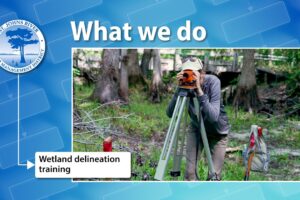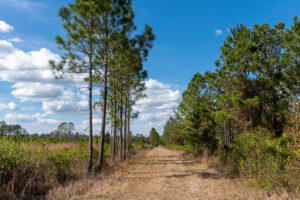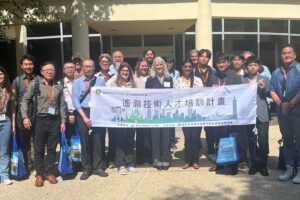Blue School Grant helps incorporate sustainable agriculture inside and outside the classroom
Teaching middle school can be challenging, especially when it comes to making earth and space science exciting. James Jones, a seventh-grade teacher at Wedgefield School in Orange County, spends a lot of time finding ways to connect these concepts to the real world—a task that’s often easier said than done.
For the past few years, Jones has used rocket launches to spark his students’ interest. While the launches were thrilling, they were one-time events that came with a hefty price tag, and as SpaceX began launching rockets as often as twice a week, the initial excitement around rockets began to fade.
One evening, Jones’s wife mentioned that she had come across the St. Johns River Water Management District’s Blue School Grant Program. The program offers teachers within the District the chance to apply for up to $3,000 to help students develop a lifelong appreciation for Florida’s water resources. Instantly, Jones began brainstorming ideas.
“I kept thinking about the chemistry set I got when I was 11, which came with a small plastic tub for growing plants without soil. I couldn’t believe it worked,” Jones explains. Over the years, I’ve looked into hydroponics for growing vegetables. While researching for the grant, I found a few classroom versions, and by chance, the county office had more information. That’s when it all clicked.”
With the grant in mind, Jones decided to apply for funding not only for a hydroponic garden —a method of growing plants without soil, using nutrient-rich water instead — to set up in his classroom, but also for a field trip to see farming in action. He reached out to the Plant Science and Horticulture Programs at Valencia College’s West Campus, who connected him with 4Roots, a nonprofit organization dedicated to unearthing the power of food to build healthy communities. The organization had recently opened an education center focused on showcasing cutting-edge advancements in agriculture.
District Education and Outreach Coordinator Ali Pressel was enthusiastic about Jones’s application. “Hydroponic gardens are incredibly water-efficient,” Pressel explains. “They use about 90% less water than traditional farming because the water keeps cycling through the system. Plus, since nutrients go straight to the plants in the water, there’s less need for chemicals that could end up polluting the surrounding environment. That’s a great lesson for his students.”
The field trip to 4Roots Farm played a crucial role in bringing this vision to life. At the farm, students were introduced to above-ground gardening techniques that rely on water and nutrients from aquaponics to nourish plants. They saw how these innovative systems can be used to grow crops efficiently, even in small or urban spaces. “Students got to touch, see, and some of them even ate cherry tomatoes right off the vine growing at the farm,” Jones recalls with a smile.
Now, back in the classroom, the students are putting their newfound knowledge into practice. With the hydroponic system set up in their own classroom, they will soon begin growing their own food in a sustainable way. “The best part is that they can see the results of their hard work,” says Jones. “They’ll be able to watch their plants grow, and in a few months, they’ll be eating food they helped grow themselves, while conserving water in the process.”
Jones’s vision goes beyond simply teaching his students about hydroponics. “I really want my students to know that science isn’t just about laws and theories,” he says. “It’s about practical things—taking what you learn in the classroom and using it in your own life. It’s about finding solutions to problems and being able to apply that knowledge in ways that make a difference.”
Jones is one of the many teachers who have taken advantage of the Blue School Grant Program and other resources from the District. The program is open to kindergarten through 12th grade public and charter school teachers within the District’s 18 counties. The Blue School Grant application period opens on Aug. 1. To learn more, visit the District’s website at www.sjrwmd.com/education/blue-school and explore an interactive StoryMap.





